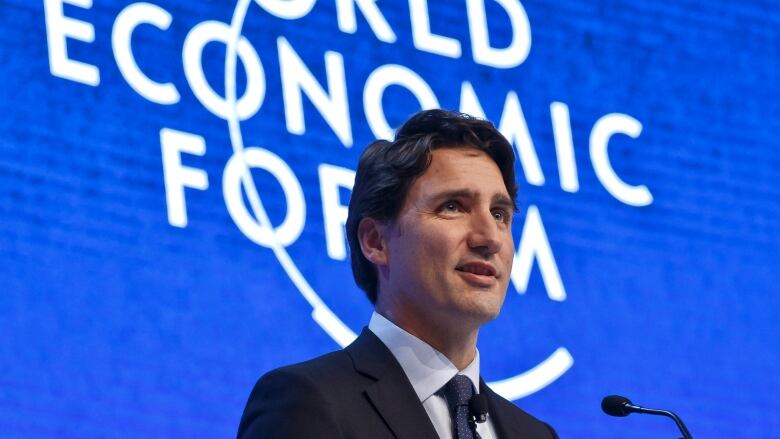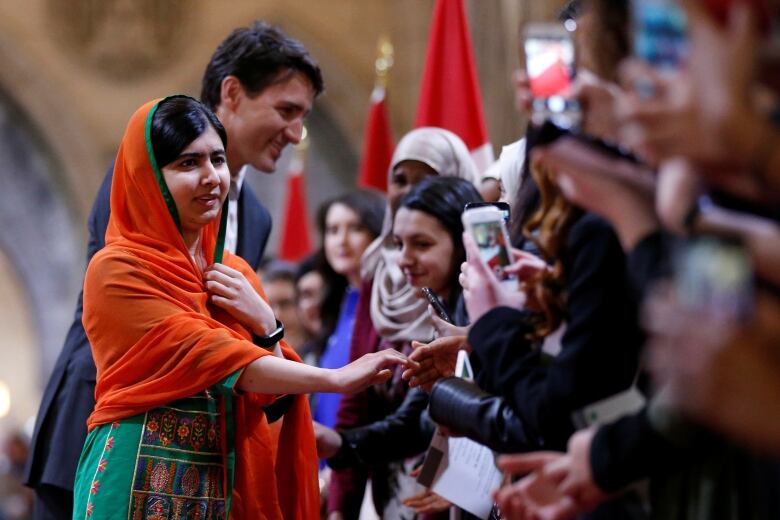Lower U.S. business taxes, uncertainty over NAFTA complicate Trudeau's investment pitch in Davos
PM and 4 ministers attending annual gathering of business and political elite

One of Canada's central aims at this year's World Economic Forum is to convince global business leaders that Canada is still an attractive place to invest.
It is a challenge made all the more difficult because of the uncertainties posed by ongoing NAFTA negotiations and recent cuts to U.S. corporate and business rates that threaten Canada's competitive advantages.
Prime Minister Justin Trudeau and a bevy of top cabinet ministers, including the finance and foreign affairs ministers,fly to Davoson Monday, where political leaders, business elite, non-governmental organizations and even some celebrities meet and mingle with the goal of finding solutions to some of the world's biggest challenges.
"Davos is not an internationally sanctioned body of economic decision makers, like the IMF or World Bank," said Laura Dawson, director of the Canada Institute at the Wilson Center in Washington, D.C.
"This is kind of like a trade show where folks whoare in business and economics, anda lot of world leaders, go to see and be seen."
The theme of this year's meeting is "Creating a Shared Future in a Fractured World."
The Trump factor
Part of that fracturing is blamed on rising populism and protectionism, most notably exemplifiedby U.S. President Donald Trump, who surprised many by announcing he will attend theglobalist forum this year. It's the first time a sittingAmerican president is going since Bill Clinton wentin 2000.
"It's a real departure for Trump, but in this case I think he wants to take a victory lap for what he's done on tax reform, for the evidence of growth in the stock market, employment numbers. He wants to take credit for that," said Dawson.
It's because ofTrump that Canada has to work so hard to remind investors that Canada is open for business. Ongoing tumultuous NAFTAtalks have created so much uncertainty that businesses have become wary of investing in Canada, something the governor of the Bank of Canada said last week is one of the major issues "keeping [him] up at night."
NAFTA aside,U.S. lawmakers passed a bill in December that slashedcorporate and other taxes south of the border, making the U.S. much more competitive with Canada.
"When it comes to attracting foreign direct investment, we need to demonstrate confidence in the Canadian economy," said one senior government official. "We need to show why it's a good place to invest."
It's also an opportunity to forge the beginnings of new trade relationships as Canada continues to try to diversify its export markets.
Not giving up on Asia
"Things didn't go well for Canada in the fallin the two visits to Asia," said Canadian Chamber of Commerce President and CEO Perrin Beatty. "This is an opportunity for Mr. Trudeau to make it clear that we want to strengthen our trading relationships and that we're prepared to work very closely with our partners on that."
Not that Canada will necessarilywalk away from Davos with big announcements, but it's better to be there than to not be there.
"We could say that we're not going to participate, we're not going to attend. But the thing we risk is [if] we're not there for part of the conversation, we can't be part of the solution and we certainly wouldn't make the impact that I think we can and should," said Bill Thomas, global chairman of KPMG International, who will be one of the Canadian business leaders at Davos.
In other words, as the saying goes, ifyou're not at the table, you're on the menu.
Gender-based policy making
The forum is also a chance for Canada to brand itself. And this year the Liberal government wants to show itselfa leader on advancing gender equality and women's empowerment.
For example, senior government officials tell CBC News that Canada will meet withother countries that have had success when doing gender-based budgeting, such as Norway and Sweden.

And Trudeau will hold a public session with Nobel Peace Prize winnerMalala Yousafzai, the Pakistani girl who was shot in the head by the Taliban on her way to school.
"We must have the full and equal participation of all to have economies that work for everyone and a future that is fairer, more inclusive and more compassionate," said Trudeau in a news release.
Canada holds the presidency of the G7 this year. Davosis an opportunity for pre-meetings with G7 leaders as Canada works towardchoosingwhat initiative it will champion at the leaders summit in June.
"As a kind of focus group for shopping some potential ideas and objectives Canada might have to see how they resonate with the global community, Davos is ideal for that," saidDawson.













_(720p).jpg)


 OFFICIAL HD MUSIC VIDEO.jpg)
.jpg)



























































































